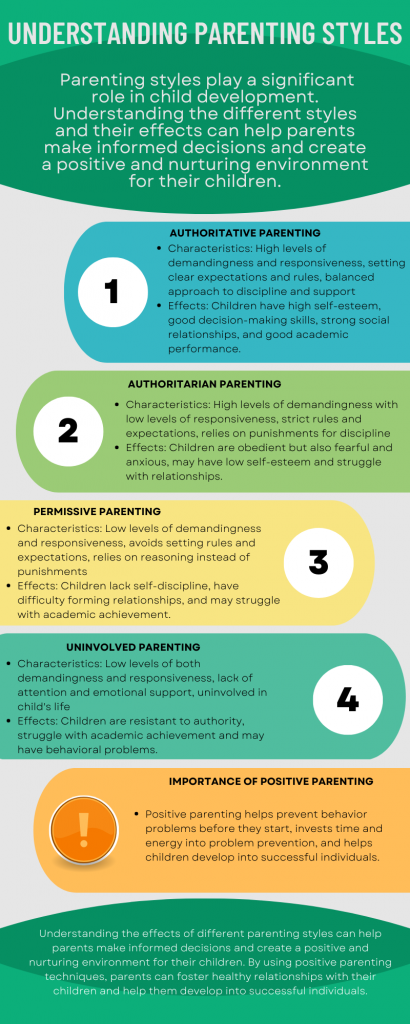Whether you are a new parent or a veteran one, understanding the different parenting styles can help you to make conscious decisions that will ultimately result in raising children with strong values and healthy self-esteem. In this blog post, we will explore the 4 parenting styles – authoritarian, authoritative, permissive and uninvolved – as well as their pros and cons. Read on to learn more!

Introduction
This blog post aims to explore the various parenting styles and their impact on children. The discussion begins by defining what parenting styles are and then delves into the four most common types: authoritative, authoritarian, permissive, and uninvolved. Each of these styles will be closely analyzed, with a focus on their unique characteristics and effects on children.
In the final section, the blog post provides a guide on how to identify your personal parenting style and offers tips on how to strengthen it. The ultimate goal of the blog post is to educate parents and caregivers on the four different parenting styles, and to encourage positive and healthy parenting practices that foster a positive family dynamic and promote the well-being of children.
Authoritative Parenting
Authoritative parenting is a well-established and highly regarded parenting style that emphasizes high expectations and open communication between parents and children. This style is founded on the principles of mutual respect and open dialogue, which allows for a supportive and nurturing environment where children can grow and develop.
Parents who employ an authoritative parenting style are known for being warm, supportive, and providing clear guidelines for their children. They understand that children need room to make their own decisions and learn from their mistakes, and are always available to offer guidance and support when needed. Authoritative parents balance a child’s need for independence with structure and support, which helps build a child’s confidence and self-esteem.
The benefits of this parenting style have been widely studied, and research has consistently shown that children raised by authoritative parents have higher self-esteem, better academic performance, and are more likely to develop positive relationships with others. Additionally, these children are less likely to engage in risky behaviors, have lower levels of stress, and are more likely to grow into well-adjusted and successful adults.
Authoritative parenting is a well-balanced and highly effective style that provides children with the structure and support they need to succeed while allowing them to learn from their mistakes and make their own decisions. By fostering a warm, supportive, and open relationship with their children, authoritative parents can help their children build self-esteem, achieve academic success, and develop into well-rounded and confident adults.
Authoritarian Parenting
Authoritarian parenting is a strict and controlled parenting style that focuses on obedience and the enforcement of rules. In this style, parents set strict guidelines for their children and expect them to follow these rules without question or negotiation. Authoritarian parents place a strong emphasis on discipline and obedience, and they are often demanding, but not responsive, meaning they may not offer emotional support or warmth.
This parenting style often involves the use of punishment as a means of maintaining order and discouraging rule-breaking. Children who are raised with an authoritarian parenting style may feel pressured to conform to their parents’ expectations, and may struggle to express themselves or assert their own opinions. They may also have difficulty disagreeing with authority figures, which can have negative impacts on their relationships and personal development.
While authoritarian parenting may result in well-behaved children, it can also lead to low self-esteem, fear of expressing themselves, and a lack of independence and creativity. Children who are raised in this type of environment may also struggle to develop healthy relationships, as they may be less likely to feel comfortable expressing their thoughts and feelings.
Authoritarian parenting is a strict and controlled style that places a strong emphasis on obedience and the enforcement of rules. While it may lead to well-behaved children, it can also have negative impacts on their self-esteem, relationships, and personal development. Parents who adopt this style should consider incorporating elements of other parenting styles, such as authoritative or permissive, to help promote a more balanced and supportive environment for their children.
Permissive Parenting
Permissive parenting is a relaxed and nurturing parenting style characterized by low demands and high responsiveness. Parents who adopt this style are known for being warm, communicative, and indulgent, and they tend to provide their children with a lot of freedom to make their own decisions. They may also be less involved in setting limits or enforcing rules, leading to a lack of structure and guidance for their children.
While permissive parenting may foster independence and the development of problem-solving skills, it can also have negative consequences. Children who are raised in this type of environment may feel neglected or overwhelmed, as they may not have clear boundaries or expectations set for them. Additionally, they may struggle to regulate their own behavior, as they have not been taught to do so by their parents.
Moreover, permissive parenting may lead to low self-discipline, difficulty following rules, and a lack of respect for authority figures. Children who are raised in a permissive environment may also have trouble adapting to more structured environments, such as schools or workplaces, which can have negative impacts on their future success.
Permissive parenting is a relaxed and nurturing style that places a high value on responsiveness and low demands. While it may foster independence and problem-solving skills, it can also lead to children feeling neglected or overwhelmed. Parents who adopt this style should aim to strike a balance between being supportive and setting clear boundaries to provide structure and guidance for their children.
Uninvolved Parenting
Uninvolved parenting, also known as neglectful parenting, is a style characterized by a complete detachment from a child’s needs. Parents who adopt this style show little to no interest in their child’s activities and are marked by a lack of communication, guidance, and support. This type of parenting often results in children feeling neglected and unsupported, which can have significant impacts on their social, emotional, and behavioral development.
In an uninvolved parenting style, parents tend to be emotionally distant and disengaged from their child’s life. They may not attend to their child’s basic needs, such as providing adequate care or ensuring their safety. This lack of attention and care can have a lasting impact on a child’s self-esteem, self-worth, and overall well-being.
Moreover, uninvolved parenting can lead to difficulties in forming healthy relationships and social connections, as children may struggle to trust and connect with others. Children who grow up in this type of environment may also have trouble regulating their emotions and behavior, leading to issues such as substance abuse, aggression, and delinquency.
It is important for parents to be aware of the signs of uninvolved parenting, so they can take steps to address it. This may involve seeking support from friends, family, or professionals, such as a therapist or counselor. Parents who recognize they are engaging in uninvolved parenting may also benefit from developing positive parenting skills and learning effective communication techniques.
In conclusion, uninvolved parenting, also known as neglectful parenting, is a style characterized by a lack of responsiveness to a child’s needs. This type of parenting can have long-term negative impacts on a child’s development, including issues with self-esteem, relationships, and behavior. Parents who recognize uninvolved parenting should seek support and work to develop positive parenting skills for the benefit of their child’s well-being.
Effects of Different Parenting Styles on Children
The effects of different parenting styles on children can be far-reaching and long-lasting. While authoritative parenting, characterized by high levels of demandingness and responsiveness, is often associated with children who have high self-esteem, good decision-making skills, and strong social relationships, authoritarian parenting, which involves high levels of demandingness with low levels of responsiveness, can lead to children who are obedient but also fearful and anxious.
On the other hand, permissive parenting, characterized by low levels of demandingness and responsiveness, can result in children who lack self-discipline and struggle with forming relationships with others. And lastly, uninvolved parenting, which involves low levels of both demandingness and responsiveness, can lead to children who are resistant to authority and struggle with academic achievement.
It’s important to remember that every child is unique and may respond differently to the same parenting style, and that parenting styles can change and evolve over time based on the changing needs of the child and the family. A balanced approach to parenting, one that combines aspects of different parenting styles, can often lead to the best outcomes for children. By striving for a balance between setting boundaries, providing support, and allowing for independence, parents can help their children become confident, capable, and well-adjusted individuals.
How to Identify Your Parenting Style
Determining your parenting style is crucial in becoming an effective parent. One way to identify your parenting style is to reflect on your daily interactions with your child, your discipline and reward strategies, and your level of involvement in their activities. Consider whether you have a strict, rule-abiding approach or a more relaxed, open-ended one. Take a look at the methods you use to shape your child’s behavior, such as utilizing positive reinforcement to promote positive actions, or relying on punishment to correct negative behaviors.
Additionally, consider your level of support and encouragement towards your child’s interests and pursuits. By considering these factors, you can gain insight into what parenting style aligns with your approach. It is also important to note that parenting styles can evolve and change over time, and it is common for parents to adopt different elements from different parenting styles. Additionally, a parent’s parenting style may vary depending on the child, their individual needs and personality, and the situation. Recognizing your parenting style and its effects on your child can help you to make positive changes and adapt your parenting style as your child grows and develops.
Tips for Strengthening Your Parenting Style
Strengthening one’s parenting style can be achieved through a few key tips. Firstly, it’s important to be consistent in establishing clear expectations, rules, and consequences, and following through with them, as this builds trust and security for children. Additionally, practicing active listening and valuing a child’s feelings and opinions can improve communication and relationship. Encouraging independence by allowing children to make decisions and learn from their mistakes also helps foster their growth and development. Positive reinforcement and praise for good behavior can boost a child’s self-esteem and encourage repeat behavior.
Parents should also seek support from friends, family, or professionals, as well as being a good role model for their children by exhibiting the behavior and values they wish to instill. Self-care is also crucial for parents, as taking care of one’s own mental and physical well-being can make them better equipped to parent effectively. Lastly, using logical consequences instead of punishments can be a more effective means of guiding and correcting a child’s behavior.
Logical consequences are natural consequences that directly result from a child’s behavior. For example, if a child breaks a toy, the logical consequence could be that they are responsible for fixing or replacing it. Logical consequences help children understand the cause-and-effect relationship between their behavior and the consequences, and they encourage responsibility and problem-solving skills. On the other hand, punishments tend to focus on imposing suffering or fear in response to misbehavior, which can be damaging to the parent-child relationship and reduce intrinsic motivation.
The Benefits of Positive Parenting
Positive parenting styles have been proven to have numerous positive impacts on the development of children. The authoritative parenting style, which is often considered a type of positive parenting, focuses on setting clear expectations, rules, and consequences, while also being warm, supportive, and responsive to a child’s needs. With positive parenting, parents become more aware of their child’s needs and develop a deeper connection with them.
By investing in preventive measures, positive parenting helps address potential behavioral issues before they become major problems. Furthermore, children raised through positive parenting tend to have better academic outcomes, exhibit fewer behavioral difficulties, and exhibit better overall mental health. By prioritizing a supportive and nurturing environment, positive parenting helps set children up for success in life.
Conclusion
In conclusion, the way a parent raises a child can significantly impact their development. Recognizing and understanding different parenting styles, including their pros and cons, can assist parents in determining the best approach for their family. The aim of parenting should be to establish a positive and supportive environment where children feel secure, valued and have their needs met. Effective positive parenting practices, such as authoritative parenting, that involve setting high standards while being responsive, nurturing, and respectful, can help prevent behavior problems, improve academic performance, and enhance children’s mental health.
Additionally, providing children with independence and trust, engaging in active listening and being a positive role model, are important steps in building strong relationships with children and helping them become successful individuals.
Infographic





I was excited to uncover this site. I need to to thank you for your time for this particularly wonderful read!! I definitely savored every part of it and I have you saved to fav to see new stuff in your site.